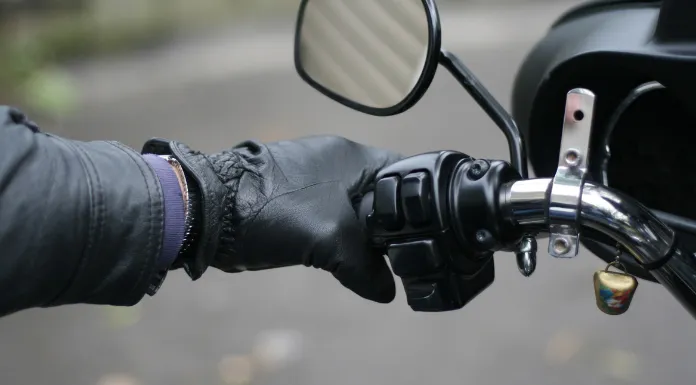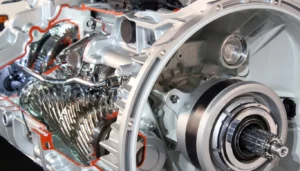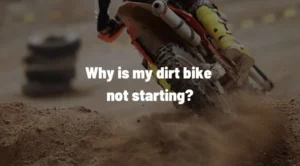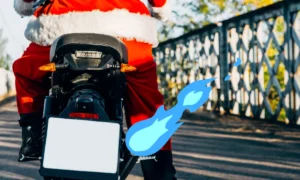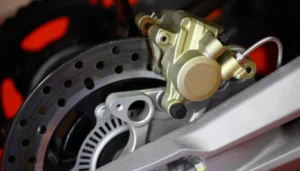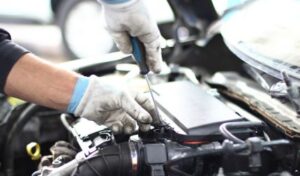One of the most common problems you may face with your motorcycle includes trouble with the clutch.
Since it is intended to help you transition safely between gears, it makes sense that the clutch system is tough and might be a bit difficult to pull.
However, when it is becoming too difficult to pull. It can make one wonder what causes a motorcycle clutch to be stiff.
Many things may be the cause. However, before trying to figure out the problem on your own, you need to consider each of the different reasons why this could be happening and take a diagnostic look at your bike.
Why Is Your Motorcycle Clutch So Stiff?
1. Clutch Cable
One of the most common causes of a clutch that is too difficult to pull involves the clutch cable. That is the cable that runs from your clutch handle down to your clutch plates.
The clutch cable is essential to a functional clutch because it responds when you pull the clutch and works with the clutch plates and springs to help you switch gears.
2. Dirty or worn-out the clutch lever
Whether from being idle to going in motion or while increasing speed, the lever is constantly being pulled on when switching gears.
Since it is the most physically used part of the entire clutch system, it can become damaged over time.
If there is no structural damage to the clutch lever, there is another possibility.
Materials can get jammed in the creases where the clutch lever pivots to engage the rest of the system, whether it be from:
- Poor weather conditions
- Dirt and other particles on your hands or gloves
- Anything else like pollen build-up and all of this can make your clutch stiff.
3. Cable routing installation
Is Your Cable Routing Installed Incorrectly?
Going back to the clutch cable, failure to attach the cable correctly from the clutch lever to the clutch plates can result in a stiff clutch.
If the cable is not connected properly, the clutch could either be pulled with no problem whatsoever but have no result or be pulled as hard as possible and never budge.
4. Your clutch lever might need to be adjusted
One other small issue that can explain why your clutch is too hard to pull is if the lever needs to be adjusted.
Most clutch levers are adjustable, and if you buy your motorcycle and do not adjust the lever to your liking, it might be in a position that appears to make your clutch faulty.
Your hands may be too big or too small, or the lever might just be in a wonky position.
5. Are Your Clutch Springs Too Stiff Or Too Strong?
As a part of the clutch system, your motorcycle will have four to six large springs to help engage the transmission while pulling the clutch.
By pulling the clutch lever, these springs compress from the force of your hand. So, if you have tough springs, it can be a nuisance to have to pull against their stiff push-back design every time you pull the clutch.
6. Your Clutch Plates Are probably Damaged
Because the clutch plates are so strong and durable, it is not likely that you will find the problem this deep in the clutch system.
Still, general wear and tear can cause problems with any part of your bike, so if you cannot find the problem anywhere else, check the clutch plates
7. Other Interior Clutch Mechanics may be Faulty
If you cannot seem to find the source of the problem, no matter how closely you look, it might be best to take your motorcycle to the shop and have it checked out.
Sometimes, there are special cases where only an extremely experienced professional can find out what is going on. If this is the case, it does not mean there is major damage.
8. Sticking Or Binding Can Occur In The System
Related problems with the mechanics of your motorcycle involve sticking or binding in the system. If there is any build-up or damage to the interior of your bike, this can be a serious problem
If the gear selector pedal has a poor connection to your transmission, there is a chance it could also interfere with the connection to your clutch lever.
How To Fix Motorcycle Clutch Stiffness?
1. Check the clutch cable
Make sure that your clutch cable is lubricated. If you have not lubricated it in a while, old lubricants can become packed together and cake up along the cable or against the clutch plates.
If you know how to lubricate your cable yourself, this can be an easy fix. If not, call someone with experience.
If you clean off old lubricant and re-lubricate your clutch cable only to find that the clutch is still too hard to pull, you might need to take a closer look.
If too much wear and tear has caused the cable to fray or become damaged in any way, you will need to replace the clutch cable completely.
2. Fix Dirty Or Worn out the clutch lever
If you think the clutch lever might be the problem, take it off the handlebar and look at it carefully. If there is any major damage to it, you might need a replacement.
When the problem is
- Poor weather conditions
- Dirt and other particles on your hands or gloves
- Anything else like pollen build-up
It is an easy fix. Remove the clutch lever, you can clean out the lever and the area where it is attached, making sure you wipe away any dirt and dust.
3. Fix cable routing installation
After checking if the cable routing is not properly fixed,
If you have installed the cable yourself, go back and make sure it is fully connected.
You should also check to see if there are kinks anywhere in the cable that might be preventing the cable from moving.
It is essential to ensure that your cable is secure. Failure to do so can not only cause your clutch lever to be too hard to pull but also pose a risk.
4. Adjusted lever to fit your hand
Make sure the lever is specifically set to accommodate your hand. You hold the clutch pedal while riding.
Your hand won’t be able to grip the clutch lever tightly if it is not calibrated correctly, which could result in a stiff clutch.
5. Clutch springs set
To fix the clutch spring problem, you can replace the clutch springs altogether.
Of course, you may not want to do this, but if you decide to, make sure you install springs with less compression resistance.
Having looser springs will make it easier to pull your clutch. Also, ensure that the springs you buy as replacements for your clutch are made for a motorcycle clutch system.
Another option is to add washers to the spring bolt to decrease the push-back from the springs.
As long as you do not add more than 2 mm of the thickness of washers, your motorcycle’s clutch system should function just as well as before.
6. Focusing on clutch plates kit
The clutch plates are a huge part of the clutch system as they act as the main part of the system’s structural security.
If there is damage to your clutch plates, it can cause other major problems to your bike.
These damages might not be reversible, so unless it is simply dirt or lubricant that is interfering with your clutch plates, you might need to get them replaced.
Check those out before wasting your time on the plates. Although, even if you find the problem early on in your bike examination, it might not hurt to make sure the other moving parts are functional as well.
7. Many aspects go into the working parts of a motorcycle.
It might even end up being a problem with your transmission instead of the clutch itself.
In an instance like this, it may not be likely that you know what to do. So, when in doubt, find the experience to help you.
If none of this is the problem, it means your clutch was made to require a large amount of pressure to pull. Or you found a problem and fixed it, but realized the clutch is still stiff; too hard to pull.
Then, you may have to do this:
Additional Fixes For Clutch Stiffness:
Fix Your Posture
Your clutch lever may be too hard to pull because of the way you sit on your motorcycle.
If you are not comfortable with the separate article I wrote about motorcycle hard steering, you should read our article “Why is motorcycle steering hard?” by clicking here.
If you do not ride your motorcycle in a way that allows your wrists to be level with your bike’s clutch lever, you may have trouble pulling the lever.
Any awkward bend in your wrist can cause extra tension in your arms and reduce your chances of pulling the clutch with ease
You Use A Hydraulic Clutch Instead
One way to decrease the difficulty of pulling your clutch is to use a hydraulic clutch.
Some newer motorcycles come with hydraulic clutches depending on the model, but it is not very common.
If your motorcycle does not have a hydraulic clutch, you might consider replacing your old system with one.
Work On Your Grip Strength
It may seem silly, but strengthening your grip can be extremely beneficial for making it easier to pull your clutch.
Sometimes, the problem might be simply because the strength of your hand is not capable of pulling comfortably on the clutch lever.
If this is the case, perform basic hand exercises to help you work on your grip strength.
Final Note:
The clutch system is one of the most important working parts of your motorcycle, ensuring it never faces unnecessary problems that could lead to damage or injury.
There are plenty of reasons that might be the cause of your motorcycle clutch being stiff.
By learning about the possible causes mentioned above, you should be able to locate the problem and either fix it yourself or take it in for professional work.
